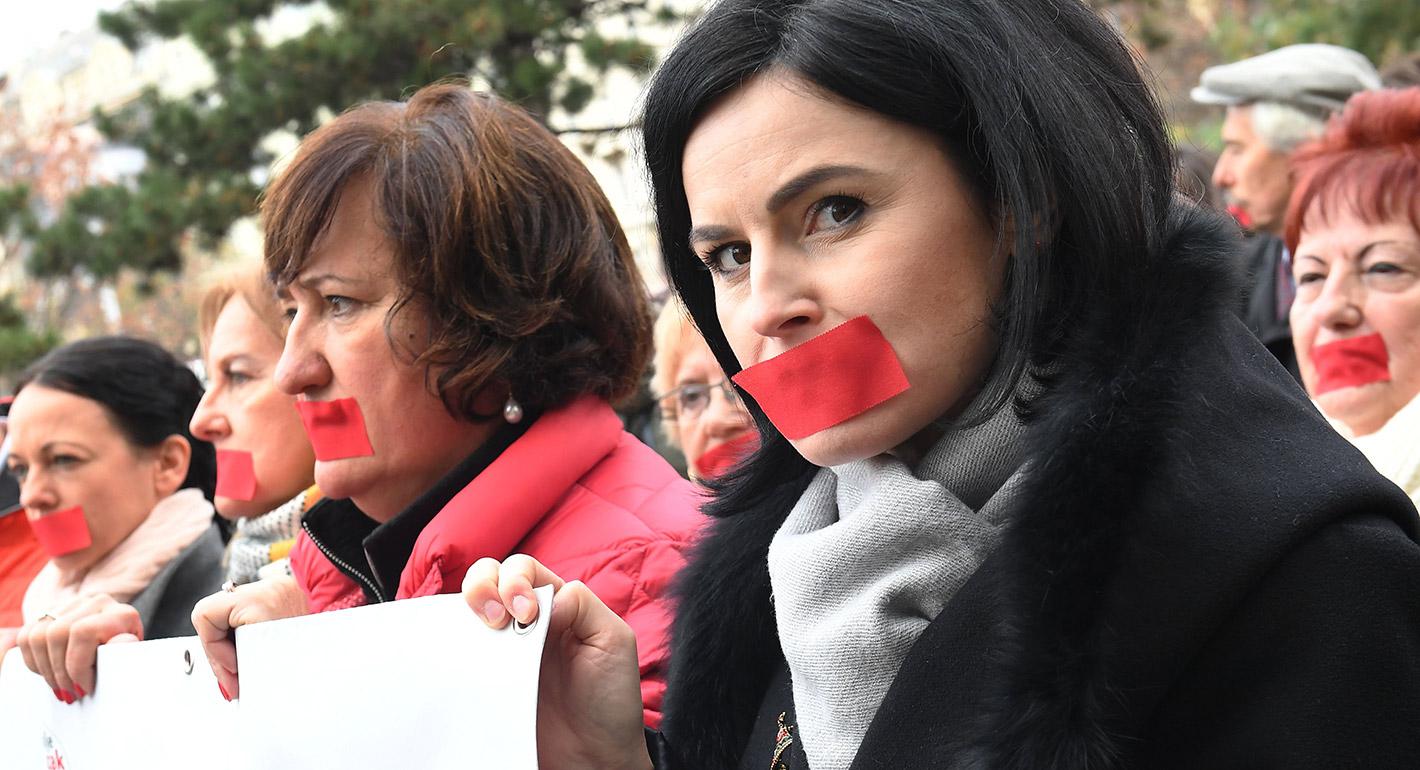It’s dangerous to dismiss Washington’s shambolic diplomacy out of hand.
Eric Ciaramella

Source: Getty
Civil society organizations throughout Europe are not taking authoritarian encroachment sitting down. Instead, they are finding creative ways to fight back.
Government restrictions on civil society are an important feature of democratic regression across Europe. In the last several years, democracy indices have recorded that many EU governments have narrowed civic space. Authorities have used a wide range of tools to constrict the space for dissent and contestation; some of their tactics are blunt, others are more subtle. While much has been written on this phenomenon, less attention has been paid to the ways in which civil society organizations (CSOs) are seeking to counter it. Yet European civil society has begun to respond to the assault on civic freedoms.
In 2018, the European Civic Forum, a transnational network of associations and nongovernmental organizations (NGOs) across Europe, launched the Civic Space Watch. This initiative aims to monitor and record threats to civil society and help CSOs across Europe coordinate their actions. The collaborative online tool seeks to better assess the state of civic space and protect and expand the freedoms of association, assembly, and expression across the EU. In two years, the Civic Space Watch has collected information on hundreds of cases in which governments are undermining fundamental rights, including instances in which CSOs are fighting back.
The detailed empirical evidence reveals three types of emerging strategies employed by civil society: efforts to build wider coalitions to defend against government restrictions, cooperation at the European level, and ad hoc forms of democratic grassroots activism. Many civic efforts remain small and tentative, but European civil society is now well into a phase of adjusting to defend and expand democracy.
Governments that seek to reduce space for independent civil society have sometimes exploited cases in which civil society is fragmented, lacks deep roots in local communities, and is highly dependent on public funding. Many CSOs have started to redress these long-standing structural weaknesses by improving their reach and building stronger and broader civic coalitions.
The Hungarian coalition Civilizáció (Civilization), recognized by its red heart symbol, emerged in early 2017 specifically to counter government plans to stifle foreign funding for CSOs. About thirty large civic organizations working on a range of issues—including human rights, the environment, and community development—started to meet to build common responses. This level of cooperation among different parts of civil society is unprecedented in Hungary. The coalition organized several major actions, such as a street demonstration that drew about 10,000 people to Budapest’s Heroes’ Square. A group of CSOs submitted a joint petition to the Hungarian Constitutional Court to challenge the government’s measures, which became law in June 2017.
The coalition developed a strategy based on four Cs: coalitions, communication, constituencies, and communities. The aim was not only to deepen coalitions among various CSOs but also to broaden connections among CSOs, citizens, and smaller community groups outside Budapest. The Hungarian government continues its attacks on civil society, but a far larger network of actors than before now contests each government offensive.
In Poland, a government smear campaign against civil society prompted a host of organizations dealing with different rights issues to form a coalition to protect the civic sector. In 2018, the group launched the campaign To działa (It Works) to win over citizens as allies in the battle against increasingly repressive state authorities.
Attacks on CSOs in Hungary and Poland were a wake-up call for associations across Europe. In Slovakia and Slovenia, CSOs have not suffered such egregious attacks, but they are acutely aware of mounting problems in Hungary and Poland. CSOs in Slovakia and Slovenia have recently organized themselves into coalitions, with the aim of reacting in a quick, united fashion when new threats appear.
In Latvia, questions were raised in the parliament about the funding of NGOs, especially those working on sexual and reproductive rights. In response, civic organizations increased their efforts to coordinate better and speak openly about their role in society, in particular after the CIVICUS monitor, a research tool that provides data on the state of civil society around the world, downgraded Latvia to having a narrowed civic space.
Similar coordination efforts have emerged or been strengthened across Europe, with varying degrees of success. New funding opportunities tailored to coalition building have helped this trend gain steam. One example is the philanthropic initiative Civitates, which sixteen foundations created to pool resources more effectively against threats to civic space and democracy more broadly.
In Spain, the collective Defender a quien Defiende (Defending the Defenders) brings together human rights defenders, journalists, psychologists, legal experts, and social movements to oppose highly restrictive gag laws that were introduced in 2015 and that have led to the criminalization of protesters. This coalition is organized in territorial nodes to better map instances of state and police repression. It provides legal and psychological support to those in need and uses the data collected for advocacy purposes at the national and, more recently, international levels.
More focused alliances are proliferating across Europe. The Coalition for Civil Society Freedom pushes for electoral reform in Ireland. The German Allianz Rechtssicherheit für politische Willensbildung (Alliance for Legal Certainty for Political Decisionmaking) calls for a change in the German tax law on charities so that civic organizations would not be stripped of tax advantages for speaking out on political issues. In France, the coalition On Ne Se Taira Pas! (We Will Not Be Silenced!) has filed against lawsuits that target civic actors and journalists. In the United Kingdom (UK), the initiative Protest Justice maps incidents reported during protests and coordinates civil society criticism of these cases.
Coordination efforts have gained momentum not only nationally but also among civil society bodies in different European countries. CSOs have become more acutely aware of restrictive patterns that have been repeating across many European states. Civil society has begun to seek out opportunities to learn lessons across national boundaries and brainstorm with associations in other countries.
The Hungarian organization Civilizáció has been engaging with organizations that seek to map and support civic groups in other countries. The European Economic Area (EEA) and Norway Grants—the contributions of Iceland, Liechtenstein, and Norway to reducing disparities in the EEA, which comprises the EU and these three countries—have dedicated part of their funding for civil society in Central and Eastern Europe to networks that promote regional synergies. When tensions arose in Hungary, these regional networks mobilized in solidarity with Hungarian civil society.
Similarly, Spanish organizations are leading a project on freedom of protest in Europe. In Barcelona in November 2019, the project brought together several organizations that monitor assemblies and police actions as well as social movements from multiple countries.
Civil society has been organizing itself into cross-border, thematic networks and federations since the early 1990s, but there is now a clear Europeanization of civil society, with transnational solidarity and support for organizations under threat. An important development is the creation of Civil Society Europe as a trans-sector coordination body for CSO networks in Brussels. The organization brings together twenty-nine European networks “working towards regenerating the European project around the shared values of equality, solidarity, inclusiveness and democracy.” The body aims to strengthen pan-European actions and advocacy efforts on civic space and democracy more generally. It also seeks to foster dialogue among European CSOs and policymakers and bolster organizations’ activities and relations with the EU institutions.
In the last several years, CSOs have increasingly been using international and European channels like the Venice Commission (an advisory body of the Council of Europe), United Nations’ special rapporteurs, and the European Court of Justice to hold governments accountable for upholding their democratic commitments. Pan-European networks have become much more assertive and proactive in pressing EU institutions to get involved in defending civic and democratic spaces.
Many European networks of CSOs that do not deal directly with democracy or citizenship include civic space in their advocacy toward EU institutions. In November 2018, dozens of organizations working in different fields at the national and European levels drafted a five-step action plan they want EU institutions to adopt on civic space. This kind of engagement has become a more present, cross-cutting priority for European civil society, whereas previously, it was of more limited interest to political, rights-focused CSOs.
As democracy and social rights have come under pressure, more horizontal forms of organization and pop-up activism have spread through Europe alongside formal CSO mobilization and activities. This informal activism reveals the concerns of many citizens who mobilize to protect democracy and rights. In many cases, these actions are sparked by specific worries, but they also target the wider demands of effective democracy, inclusive societies, and open civic space.
In Italy, the Sardine (Sardines) movement has been mobilizing tens or even hundreds of thousands of people to oppose hate speech and racism. Among the group’s more general demands is the abolition of two security decrees that have toughened legislation on migrant rights and on freedom of assembly.
Also in Italy, in 2018, a group of national and local associations created Mediterranea—Saving Humans, an initiative to monitor human rights violations of refugees and migrants crossing the Mediterranean Sea. The initiative, supported by tens of thousands of people across Italy, was a response to the Italian government’s criminalization of solidarity with migrants through laws, regulations, and criminal prosecutions. Many search-and-rescue NGOs were forced to abandon their work. Mediterranea—Saving Humans defines itself as a “nongovernmental action” committed to moral disobedience against the far right and civil obedience of international human rights standards.
In Poland, the civic movement Obywatele RP (Citizens of Poland) has engaged in civil disobedience against the government’s restrictions on the freedom of assembly, particularly over a 2016 law that effectively allows authorities to prevent protests against far-right marches. Obywatele RP has also formed a mutual support initiative, ObyPomoc, which puts convicted protesters in contact with lawyers who give them free legal support.
In Spain in 2014, social groups that had been fighting austerity since 2011 created the movement No Somos Delito (We Are Not a Crime) as a reaction to the gag laws against the freedom of protest. In April 2015, No Somos Delito activists carried out the first hologram protest, a virtual protest to make the point that the reform allowed people to demonstrate only as holograms. About 18,000 people left a hologram or voice message on a website, and these messages were later incorporated into a video projected in front of the Spanish parliament. In 2019, the group used artificial intelligence to create a vocal performance of songs by jailed artists to denounce state censorship.
Criminalized communities are increasingly self-organizing. In France, marginalized neighbors and families of victims who have suffered from police violence are leading mobilization efforts. In Romania, Romani activists are at the forefront of the struggle for reforms of housing policies. In the UK, affected communities have been protecting for years against fracking sites around the country. In 2019, the British government dropped its support for future drilling projects.
At a time when civil society is under attack across Europe and in real danger in some countries, CSOs have begun to adjust their actions in response. With so much attention on shrinking democratic space, this incipient civic pushback is still understudied and underanalyzed. These many admirable civil society initiatives deserve more recognition from the EU institutions, which claim to be committed to fundamental freedoms. The kinds of CSOs and activists described above are investing huge amounts of energy in defending what the union claims are its core values. Yet so far the EU has not been especially supportive of them. That increases the risks of further targeted repression against the activists involved.
A 2017 survey by Civil Society Europe showed that many CSOs saw the EU institutions as “inactive or not doing enough” to support democratic values. There is a widespread feeling that the EU’s inertia in places where democratic values are menaced will simply embolden obscurantist views and undercut new CSO strategies.
At the same time, the issue of civic space is slowly appearing on EU institutions’ radars. The European Parliament’s democracy, rule of law, and fundamental rights monitoring group recently included civic space in its mandate. European Commissioner Věra Jourová’s remit now encompasses a commitment to “maintain an open, transparent and regular dialogue with representative associations and civil society” and “pay special attention to the protection of the right of peaceful assembly and the freedom of association.” This addition to the first draft of her mandate is a victory for European civil society, which for years had been calling for more effective dialogue with civil society and citizens.
However, the EU still needs to develop a clear strategy to support civil society’s pushback against the negative trends that affect democracy. Many people, especially those who feel left out, judge the quality of European democracy and the functioning of the EU’s institutions on the way their concerns and needs are addressed. Any strategy to make democracy work for all and ensure full respect for the rule of law in the EU should include regular assessments of how EU and national legislation affects all groups in society, especially vulnerable ones.
The EU needs to directly support organizations that help such groups and protect bodies and individuals under pressure—as it does in countries outside the union. The EU’s Rights and Values Program, whose budget is currently being renegotiated, will be effective only if it is equipped with adequate financial resources; at the moment, it is not. The EU institutions should prioritize more structured partnerships with civic associations to help strengthen the nascent civic pushback that has emerged.
For their part, CSOs have embarked on what will be a long road, not only of resisting the moves of illiberal governments but also of working toward inclusive societies in which nobody feels left out. CSOs need to improve the way they work and communicate. They must deepen mutual cooperation, overcome fragmentation, formulate far more effective pan-European strategies and proposals, and better harness the energy of grassroots forms of mobilization. Civil society is well past the phase of simply noting and lamenting the limits on democracy; the challenge today is to extend democratic efforts to fight back, which are already taking shape.
Giada Negri is a research and advocacy officer at the European Civic Forum. She coordinates the Civic Space Watch, an online tool for monitoring civic space in Europe.
This article is part of the Reshaping European Democracy project, an initiative of Carnegie’s Democracy, Conflict, and Governance Program and Carnegie Europe.
Carnegie does not take institutional positions on public policy issues; the views represented herein are those of the author(s) and do not necessarily reflect the views of Carnegie, its staff, or its trustees.
It’s dangerous to dismiss Washington’s shambolic diplomacy out of hand.

Eric Ciaramella
The India AI Impact Summit offers a timely opportunity to experiment with and formalize new models of cooperation.


Lakshmee Sharma, Jane Munga
EU member states clash over how to boost the union’s competitiveness: Some want to favor European industries in public procurement, while others worry this could deter foreign investment. So, can the EU simultaneously attract global capital and reduce dependencies?

Rym Momtaz, ed.
Europe’s policy of subservience to the Trump administration has failed. For Washington to take the EU seriously, its leaders now need to combine engagement with robust pushback.

Stefan Lehne
Leaning into a multispeed Europe that includes the UK is the way Europeans don’t get relegated to suffering what they must, while the mighty United States and China do what they want.

Rym Momtaz